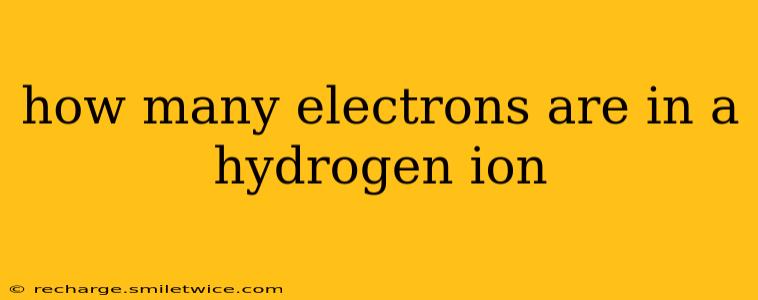How Many Electrons Are in a Hydrogen Ion?
The number of electrons in a hydrogen ion depends on the type of hydrogen ion we're discussing. Hydrogen has only one proton and one electron in its neutral state. However, hydrogen can lose or gain electrons to form ions. Let's explore the two main types:
What is a Hydrogen Ion?
A hydrogen ion is a hydrogen atom that has lost or gained an electron, resulting in a net positive or negative charge. This happens because atoms strive for stability, often achieving it by having a full outer electron shell. Hydrogen, with only one electron, can easily lose that electron to achieve a stable, empty shell.
How Many Electrons Are in a Proton (H⁺)?
The most common hydrogen ion is the proton (H⁺). This ion has zero electrons. It's simply a single proton, the positively charged particle found in the nucleus of a hydrogen atom. When a hydrogen atom loses its single electron, it becomes a proton, carrying a positive charge equal to the charge of a single electron.
Are there other Hydrogen Ions?
While less common, hydrogen can also gain an electron to form a hydride ion (H⁻). In this case, the hydride ion would have two electrons. This negative ion is much less prevalent than the proton (H⁺) and forms primarily with highly electropositive metals.
What are the implications of different hydrogen ion types?
The different hydrogen ion types have vastly different chemical properties and play different roles in various chemical reactions. The proton (H⁺), for instance, is crucial in acid-base chemistry and plays a central role in many biological processes. The hydride ion (H⁻) is a stronger reducing agent, participating in a different set of reactions.
How is the number of electrons determined?
The number of electrons in any ion is determined by comparing its charge to the number of protons in the atom's nucleus. A neutral atom has an equal number of protons and electrons. When an atom loses electrons, it gains a positive charge (becoming a cation), and when it gains electrons, it gains a negative charge (becoming an anion).
In summary, the answer to "How many electrons are in a hydrogen ion?" depends on which hydrogen ion you are referring to. The most common hydrogen ion, the proton (H⁺), has zero electrons. The less common hydride ion (H⁻) has two electrons.
